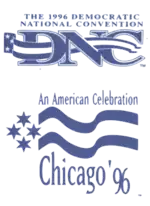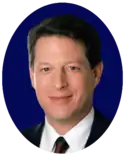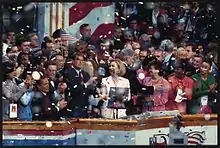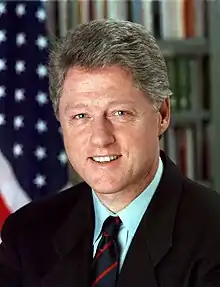1996 Democratic National Convention
The 1996 Democratic National Convention was held at the United Center in Chicago, Illinois, from August 26 to August 29, 1996. President Bill Clinton and Vice President Al Gore were nominated for reelection. This was the first national convention of either party to be held in Chicago since the disastrous riots of the 1968 Democratic convention, and as of 2020, the most recent presidential convention held in the city by either major party (it is currently scheduled to host the 2024 convention).
1996 presidential election | |
  Nominees Clinton and Gore | |
| Convention | |
|---|---|
| Date(s) | August 26–29, 1996 |
| City | Chicago, Illinois |
| Venue | United Center |
| Keynote speaker | Evan Bayh |
| Notable speakers | Christopher Dodd Mario Cuomo Hillary Clinton Christopher Reeve Ted Kennedy |
| Candidates | |
| Presidential nominee | Bill Clinton of Arkansas |
| Vice presidential nominee | Al Gore of Tennessee |
| Voting | |
| Total delegates | 4,289 |
| Votes needed for nomination | 2,147 |
| Results (president) | Clinton (AR): 4,277 (99.72%) Abstention: 12 (0.28%) |
| Results (vice president) | Gore (TN): 4,289 (100%) |
| Ballots | 1 |
Site selection

Chicago, Kansas City, Los Angeles, New Orleans, New York, and San Antonio were originally considered as possible host cities. Los Angeles withdrew its bid after the 1994 Northridge earthquake. [1] Kansas City would also withdraw.[2]
On August 4, 1994, it was announced that Chicago had beaten out the other finalist, San Antonio, for the right to host the convention.[3] This would mark the first time that Chicago hosted a major presidential year political convention since the violent 1968 Democratic National Convention, and the first time a political convention was held in the United Center, which had been built earlier that decade.[4]
During the bidding for the convention, Chicago was seen as a frontrunner. One dynamic in Chicago's favor was that chairman of the Democratic National Committee David Wilhelm had strong connections to the city.[5][6] Also seen as helpful to Chicago's odds was the goodwill that Chicago Mayor Richard M. Daley had earned with President Clinton by helping to lobby Chicago-area congressmen to support the North American Free Trade Agreement.[5] The fact that First Lady Hillary Clinton was raised in the Chicago suburbs was seen as helpful. Bill Clinton's close relationship with Mayor Daley's brother William M. Daley and Clinton's appreciation of Mayor Daley's endorsement of him during the 1992 Democratic Party presidential primaries were also seen as aiding Chicago's chances.[6] Additionally, heading into 1996, Illinois was projected to be a key "battleground state".[7]
Of the bid cities, Chicago's proposed the largest funding package, proposing that its host committee would raise $32 million for the convention.[6]
This was the 25th major party convention to be held in Chicago.[4] Chicago has held more major party conventions than any other city.[4][8][9] As of 2020, this was the last major party convention to be held in Chicago,[8] although Chicago is scheduled to host the 2024 Democratic National Convention.[6]
Bids
| City | Venue | Previous major party conventions hosted by city |
|---|---|---|
| Chicago, Illinois | United Center | Democratic: 1864, 1884, 1892, 1896, 1932, 1940, 1944, 1952, 1956, 1968 Republican: 1860, 1868, 1880, 1884, 1888, 1904, 1908, 1912, 1916, 1920, 1932, 1944, 1952, 1960 |
| New York City, New York[3] | Madison Square Garden | Democratic: 1868, 1924, 1976, 1980, 1992 |
| New Orleans, Louisiana[3] | Louisiana Superdome | Republican: 1988 |
| San Antonio, Texas | Alamodome[10] | — |
| Kansas City, Missouri (withdrew bid) | Democratic: 1900 Republican: 1928, 1976 | |
| Los Angeles, California (withdrew bid) | Los Angeles Convention Center[1] | Democratic: 1960 |
Preparations and logistics
Ahead of the convention, in order to project a positive image of the city, Mayor Daley dedicated a large amount funding towards planting new trees and decorative potted flowers throughout the West Loop area in which the convention would be held as well as in the city's downtown.[11] The convention came at a time where changes and beautification were underway in the West Loop, including the repaving of roads, the addition of decorative planters, and the installation of ornate street lamps. The Madison Street overpass above the Kennedy Expressway was decorated with red white and blue stars. Greektown underwent a streetscape enhancement project. In the weeks ahead of the convention, a demolition project on five buildings of the Henry Horner Homes near the venue was completed. City officials claime that the timing of some of the enhancements to the West Loop was coincidental.[12] Temporary decorations were also added, including stickers advertising the convention on 2,000 street signs.[12]
A temporary convention-oriented bus route was established between the United Center and locations in The Loop.[12] Events related to the convention were held in venues throughout Chicago in order to showcase the city.[13] Hundreds of events related to the convention were held.[12]
The convention introduced a new style four-screen speech prompting system for speakers consisting of two glass teleprompters, accompanied by an inset lectern monitor, and for the first time, a large under-camera confidence monitor.[14]
Notable speakers
The convention's keynote speaker was Governor Evan Bayh of Indiana. The nomination speech was given by Senator Christopher Dodd of Connecticut. Other notable speakers included former New York governor Mario Cuomo, First Lady of the United States Hillary Rodham Clinton, actor Christopher Reeve, House Minority Leader Dick Gephardt, Senate Minority Leader Tom Daschle, and other Senators Russ Feingold of Wisconsin, and John Kerry and Ted Kennedy of Massachusetts.
With Clinton's wife, Hillary, speaking at the Democratic convention, and his opponent Bob Dole's wife Elizabeth Dole having spoken at the Republican convention, 1996 became the year in which it became established practice that both major party candidates spouses speak at their party's convention.[15]
Clinton's renomination speech
.jpg.webp)

Clinton's speech on August 29 included his vision for the next decade, included tax cuts for the middle-class, 20 million more jobs, a strong defense with cuts in the military, but a strong presence of peacemaking troops, new military weapons and tanks, welfare reform goals for states and communities, and a peaceful transition for the Middle East.
Refusal of delegates to Lyndon LaRouche
Lyndon LaRouche had run for president through multiple parties over multiple election cycles. In 1996, he ran for the nomination of the Democratic party, despite the Chair of the Democratic National Party ruling that Lyndon LaRouche "is not to be considered a qualified candidate for nomination of the Democratic Party for President" before the primaries began. In subsequent primaries LaRouche received enough votes in Louisiana and Virginia to get one delegate from each state. When the state parties refused to award the delegates, LaRouche sued in federal court, claiming a violation of the Voting Rights Act. After losing in the district court, the case was appealed to the First District Court of Appeals, which sustained the lower court.[16]
Voting
Clinton was nominated unanimously for a second term and Vice President Al Gore by voice vote.
The Balloting:
| Candidates |  |
|---|---|
| Name | William J. Clinton |
| Certified Votes | 4,277 (99.72%) |
| Abstentions | 12 (0.28%) |
| total: | 4,337 |
Clinton and Gore went on to defeat Bob Dole and Jack Kemp in the November general election in an Electoral College landslide with a substantial popular vote margin.
Notable events
On August 28, Civil Rights Movement historian Randy Kryn and 10 others were arrested by the Federal Protective Service while doing a demonstration.[17]
In the middle of the convention, many of the delegates danced to the song "Macarena". Al Gore famously danced to the song while standing still.[18][19]
The original Broadway cast of Rent performed "Seasons of Love" at the end of the Convention.[20][21]
Taste of Chicago, a group of restaurants who have an annual street festival, catered the press area.
Reception
Chicago's performance as a convention host city was regarded to have been successful.[6]
See also
References
- Rainey, James (15 Feb 1994). "L.A. Halts Bid to Host GOP, Democratic Conventions". Newspapers.com. Los Angeles Times. Retrieved 18 May 2021.
- Mannies, Jo (31 Mar 1994). "City To '96 GOP: Not Here". Newspapers.com. St. Louis Post-Dispatch. Retrieved 18 May 2021.
- "Chicago Convention". CNN All Politics. Retrieved September 4, 2012.
- "AllPolitics - Democratic National Convention". www.cnn.com. CNN. 1996. Retrieved 6 August 2020.
- Fitzpatrick, James C. (3 Mar 1994). "Trying to lure the Democrats". Newspapers.com. The Kansas City Star.
- Sweet, Lynn (11 April 2023). "Chicago to host 2024 Democratic National Convention". Chicago Sun-Times. Retrieved 11 April 2023.
- Hardy, Thomas (10 December 1995). "POLITICS PRIMED FOR NEW SEASON". chicagotribune.com. Chicago Tribune. Retrieved 18 May 2021.
- "Why the Conventions No Longer Come To Chicago". NBC Chicago. WMAQ-TV. 5 September 2012. Retrieved 6 August 2020.
- Sautter, R. Craig. "Political Conventions". www.encyclopedia.chicagohistory.org. Encyclopedia of Chicago. Retrieved 6 August 2020.
- Verhovek, Sam Howe (1 Jun 1994). "San Antonio Looks for convention". Newspapers.com. The Miami Herald. New York Times Service. Retrieved 18 May 2021.
- Byrne, John; Quig, A.D. (21 May 2023). "DNC in Chicago: Good vibes expected, but questions about economic impact". Chicago Tribune. Retrieved 29 August 2023.
- "Democrats, City Putting Last Touches to the Party". Chicago Tribune. 19 August 1996.
- Bradley, Ben (11 April 2023). "A look back to when Chicago hosted the 1996 DNC". WGN-TV. Retrieved 29 August 2023.
- "Speakers send a strong message". Detroit Free Press (Detroit, Michigan). August 27, 1996. Retrieved October 12, 2019.
- "Trump, Biden Favorable Ratings Both Below 50%". Gallup.com. 18 September 2020. Retrieved 19 January 2021.
- "USA v. Khan Mohammed". U.S. Court of Appeals for the D.C. Circuit. Retrieved September 4, 2012.
- "The Federal Protective Service arrested 11 protesters Wednesday in...", United Press International, August 28, 1996, retrieved November 19, 2022
- Lawrence, Derek (July 29, 1996). "Relive Hillary Clinton dancing to the 'Macarena' at the 1996 DNC". Retrieved July 31, 2016.
- Plante, Chris (July 29, 2016). "When the Macarena moved Hillary Clinton and the 1996 Democratic National Convention to dance". The Verge. Retrieved July 31, 2016.
- Metz, Nina (February 8, 2008). "Seasons of 'Rent': From 'La Boheme' to becoming an icon". Retrieved August 1, 2016.
- Román, David (February 1, 1998). Acts of Intervention: Performance, Gay Culture, and AIDS. Indiana University Press. p. 282. ISBN 978-0-253-21168-2. Retrieved August 1, 2016.
External links
- President Clinton Speaking at the Convention on YouTube
- Democratic Party Platform of 1996 at The American Presidency Project
- Clinton Nomination Acceptance Speech for President at DNC (transcript) at The American Presidency Project
- Video of Clinton nomination acceptance speech for President at DNC (via YouTube)
- Audio of Clinton nomination acceptance speech for President at DNC
- Video of Gore nomination acceptance speech for Vice President at DNC (via YouTube)
- Audio of Gore nomination acceptance speech for Vice President at DNC
- Transcript of Gore nomination acceptance speech for Vice President at DNC Archived 2017-08-12 at the Wayback Machine
- Video of Evan Bayh's Keynote Address at Democratic National Convention
| Preceded by 1992 New York, New York |
Democratic National Conventions | Succeeded by 2000 Los Angeles, California |


